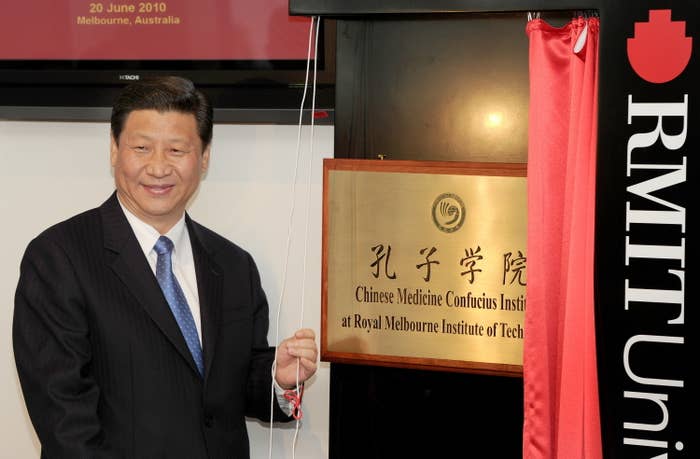
The Australian government urged Confucius Institutes at the nation’s universities to consider whether they needed to register as foreign agents, documents obtained by BuzzFeed News reveal.
Twelve Confucius Institutes — joint ventures on Australian campuses between local universities, Chinese universities and the Chinese government agency Hanban — received letters from the Attorney-General’s Department dated May 7, ahead of the federal election later that month. None of the 12 institutes have since registered with the government.
Attorney-General's Department deputy secretary Sarah Chidgey said she was writing to draw the institutes’ attention to the extra obligations that apply in an election period, and to see “your continued consideration of the applicability of the scheme to your organisation”.
“I strongly encourage you to consider whether the scheme applies to your current circumstances as a matter of urgency, and to continue to monitor this issue as circumstances change. It is an offence not to register if you are required to do so and penalties apply,” Chidgey wrote.

The letter marked an escalation from the government’s earlier language in letters sent to the institutes when the foreign influence transparency scheme began in December 2018. Those letters introduced and explained the scheme, and asked for assistance in raising awareness of registration obligations.
The documents, obtained under freedom of information laws, reveal the department sent the same letter to university leaders in December 2018 and May 2019.
Under the scheme, a person or organisation has to register as a foreign agent with the department if they have an arrangement with a foreign principal, and engage in certain lobbying, political communications, or spending activities on their behalf, designed to influence governmental or political decision-making.
Extra obligations apply in the lead-up to an election: people who have registered have to review the information they have provided and confirm it’s up to date. Reporting timeframes are also significantly reduced.
Critics have suggested that the fact that Confucius Institutes are attached to universities allow them to impede academic freedom and discussion around China.
Human Rights Watch has called upon universities to reject Confucius Institutes, saying they are fundamentally incompatible with a robust commitment to academic freedom.
But their defenders say they are language and cultural centres, like the Goethe-Institut or Alliance Francaise, nonprofit German and French cultural centres and language schools with outposts throughout the world. Unlike Confucius Institutes, they are not joint ventures with universities.
Last month, Nine newspapers revealed that a number of universities had given Beijing control over decisions on teaching quality at Confucius Institutes.
The revelation prompted education minister Dan Tehan to weigh in, saying he would raise the scheme in meetings with university vice chancellors in early August. He also said the Attorney-General’s Department was specifically examining the arrangements between Confucius Institutes and universities to make sure they were complying with the foreign influence transparency law.
In response to questions from BuzzFeed News, the department said that it continued to have “productive discussions” with Confucius Institutes and universities about the application of the foreign influence transparency scheme, but that it would be inappropriate to comment on specific matters.
The department also confirmed that it had not issued any “transparency notices” — a declaration that a person is a foreign government-related entity.
Spokespeople for the University of Western Australia, University of Newcastle, University of Sydney, RMIT University, University of Adelaide, and Queensland University of Technology told BuzzFeed News that they had looked at the law and decided their Confucius Institutes did not need to register.
RMIT said that it would take advice and guidance from the attorney-general’s office regarding the interpretation of, and obligations under, the scheme. Its Confucius Institute’s activities are focused on Chinese medicine.
The University of Sydney said that it would continue to review its obligations given recent changes to the law.
The University of Melbourne, La Trobe University, Charles Darwin University, University of New South Wales, University of Queensland and Griffith University did not respond to requests for comment.
The NSW Department of Education recently announced it would shut down its Confucius Institute, which ran Mandarin classes in schools, after an education department report concluded there was a perception that the institute could be facilitating appropriate foreign influence. An ABC report found in July that the Chinese government vetted the teachers for “good political quality” and a love of “the motherland”.
While none of the Confucius Institutes have registered, the University of Sydney’s United States Studies Centre has. It has disclosed that it is undertaking political lobbying supported by the US State Department for policy work on issues in the Indo-Pacific.
